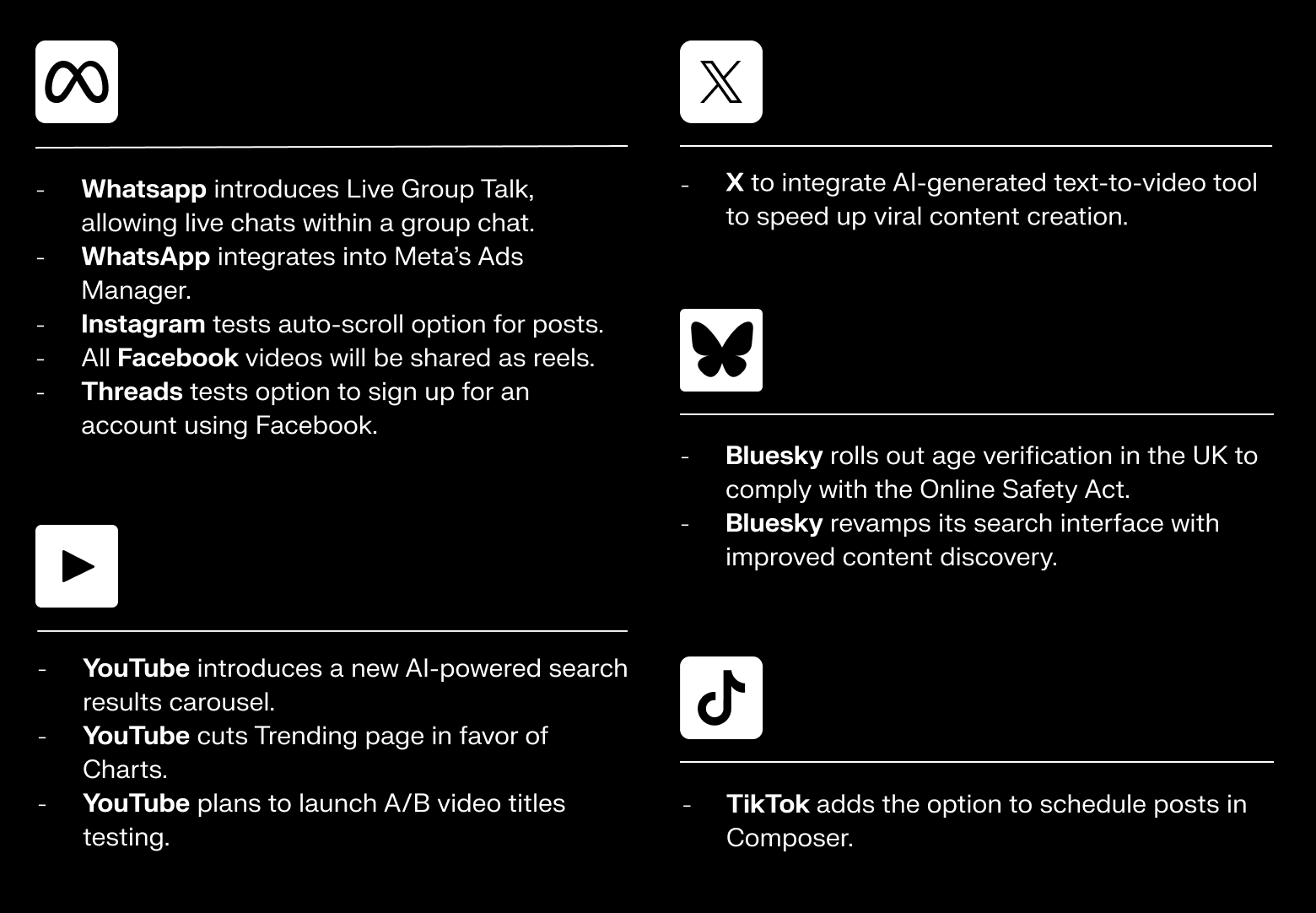Linda Yaccarino steps down as CEO of X
State of Play: Earlier this month, Linda Yaccarino resigned as CEO of X after just over a year. Her exit comes amid falling ad revenue, brand safety concerns, and leadership turmoil. Prior to joining X, Yaccarino was NBCUniversal’s ad chief and known for her ties in the advertising industry.
Why it Matters: Yaccarino was hired for her deep ad world credibility to repair relationships and stop the ad exodus on X. Her departure suggests that mission failed, and that even seasoned operators are struggling to stabilize X’s brand or monetize its audience.
TikTok’s potential sale: what’s next for the viral video giant?
State of Play: TikTok is reportedly close to a deal to spin off its U.S. operations, as pressure mounts to separate from ByteDance. A new version of the app is allegedly expected to launch on September 5, with the current version fully shut down by March 2026. Trump issued a third extension of the app store ban last month, now set to expire in mid-September. While progress appears to be underway, legal and regulatory challenges remain.
Why it Matters: With over 170 million users in the U.S., TikTok’s fate has sweeping implications for creators, brands, and the broader social media landscape. A forced sale could reshape the global tech market and set a precedent for how governments handle foreign-owned digital platforms.
Cetaphil leans into AI for Gen Z-focused advertising
State of Play: Cetaphil is revamping its online product descriptions and digital presence to ensure its skincare products are recommended by AI platforms, especially as Gen Z shoppers increasingly ask AI for advice while shopping. The brand is also developing its own AI chatbot, GAIA, supporting creators and customer service, and using generative AI for select social and ad campaigns.
Why it Matters: The skincare brand’s pivot to AI-powered advertising reflects a broader shift in brands engaging the more tech-savvy consumer, and the increasingly blurred line between human and machine-made marketing. Such a leap could reshape how brands build loyalty with the next generation of consumers.
Instagram expands Google search indexing for public posts
State of Play: Instagram is expanding its pilot program that allows public posts to be indexed and appear in Google search results. This update means users searching on Google can easily discover Instagram content, even if they don’t have an account, increasing the reach and visibility of public posts.
Why it Matters: Instagram is blurring the lines between closed social networks and the open web. This development could boost content reach, alter discoverability strategies, and influence how users and creators think about privacy.
Scroll down to Digital Decoded to learn more.
YouTube tightens monetization rules: crackdown on AI and repetitive content
State of Play: YouTube has enforced updated monetization policies to its YouTube Partner Program that target videos primarily made with AI tools or containing repetitive, low-effort content. The platform aims to encourage higher-quality, original uploads by demonetizing channels that rely on mass-produced or unoriginal formats, allowing some AI-assisted content if it adds genuine value.
Why it Matters: The push underscores YouTube’s intent to protect ad revenue and user trust. The refined policy addresses those who contribute little to the viewer experience and who dilute the quality of content on the platform.
Meta’s verified support under fire amid mass account bans
State of Play: Meta’s paid verification service, launched in 2023 with the promise of direct customer support, is under scrutiny after widespread reports of unresolved account bans. Despite paying for access, many users describe slow response times and ineffective support, pointing to deeper flaws in Meta’s moderation and escalation systems.
Why it Matters: The backlash, including a petition with 25,000+ signatures, highlights rising concerns around paid support models and the risks of automated moderation. It also raises broader questions about platform accountability and the reliability of premium services for creators and businesses.
Saudi Arabia’s creator economy surges 32% in Q1 2025, driven by TikTok
State of Play: Saudi Arabia’s creator economy grew by 32% in the first quarter of 2025, according to recent reports. TikTok led this growth, with more brands investing in local influencers and a surge in short-form video content.
Why it Matters: The rapid growth of Saudi Arabia’s creator economy highlights the region’s digital transformation and the rising influence of short-form video. It’s a sign of shifting consumer habits and new opportunities for creators and brands in emerging markets.



